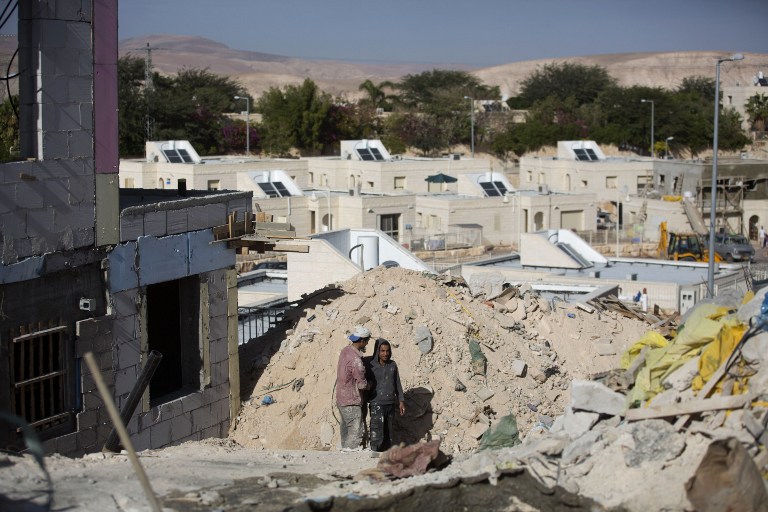SUMMARY
This is AI generated summarization, which may have errors. For context, always refer to the full article.

JERUSALEM, Israel – Israel stood firm Tuesday, December 3, in the face of mounting international pressure as it pushed ahead with a swathe of settlement plans seen as threatening the viability of a future Palestinian state.
The Palestinian leadership meeting in the West Bank announced that it would ask the UN Security Council to condemn the Israeli settlement program.
In Jerusalem, a senior European Union official said the bloc had received no indication Israel was planning to heed calls to give up on plans to build 3,000 new settler homes in a critical area of the West Bank near Jerusalem.
But Britain said the EU was unlikely to punish Israel by imposing trade sanctions, although top diplomats in the 27-nation bloc were expected to discuss further steps at a top-level meeting on Monday.
Egypt and Australia on Tuesday joined a growing list of countries who have taken the rare step of summoning the Israeli ambassador to express a formal protest over plans to build new settler homes in E1, a corridor of land near Jerusalem where construction would cleave a future Palestinian state in half.
The EU ambassador to Israel, Andrew Standley, said despite growing international calls, Israel had shown no sign it was planning to call off its construction plans.
“We’ve not had any signal or message back, for the time being, to indicate that this message has been heard and has been acted upon,” he said.
“There have been in fact, to the contrary, further messages or announcements saying Israel will act upon what it considers to be its strategic interests, which may suggest that if it sees more measures as necessary it will take more measures,” he said.
“This is not what we are asking for.”
But he refused to say whether the bloc would take further measures to sanction Israel, saying its foreign ministers were to discuss the matter on Monday at a meeting in Brussels.
But British Foreign Secretary William Hague said there did not appear to be any “enthusiasm” in the EU for any move to impose economic sanctions on Israel over its E1 development plans.
“I don’t believe there would be anywhere near a consensus,” he told parliament. “Nevertheless if there is no reversal… we will want to consider what further steps European countries should take.”
Israel’s settlement plans have always raised hackles but Friday’s proposals — seen as payback for the Palestinians securing the UN rank of a non-member state — are particularly contentious as they would make the creation of a contiguous Palestinian state almost impossible.
E1 is a corridor of West Bank land which runs between the easternmost edge of annexed east Jerusalem and the nearby Maaleh Adumim settlement.
But following four days of growing diplomatic pressure, Israel — which is in the middle of an election campaign — showed no sign of backing down.
“There will be no change in the decision that has been made,” a source in the office of Israeli Prime Minister Benjamin Netanyahu said on Monday.
And several hours later, Israel said it was reviving plans for another 1,600 homes in annexed east Jerusalem.
“Are new homes in our capital Jerusalem really more dangerous to the peace process than the Palestinian Authority’s refusal to talk peace and to recognize Israel?” tweeted Netanyahu spokesman Ofir Gendelman.
The Palestinian leadership held a meeting in Ramallah chaired by president Mahmud Abbas and attended by a top Hamas official.
It decided “as a first measure to turn to the UN Security Council… to request a constraining resolution for Israel to stop its decisions of destructive expansion and all forms of settlement.”
The international outcry since Friday’s move has been intense, with UN chief Ban Ki-moon warning that building in E1 would deal the two-state solution “an almost fatal blow”.
On Monday, France, Britain, Spain, Denmark and Sweden all summoned the Israeli ambassadors to protest the plans, which also drew criticism from Russia, Germany and Japan. Australia and Egypt followed suit on Tuesday.
Washington has warned construction in E1 “would be especially damaging to efforts to achieve a two-state solution” and President Barack Obama’s spokesman urged Israel “to reconsider”.
Israel has not given a time frame for the new construction, which has drawn praise from hardliners.
“History proves that every time we insisted on our positions and were prepared to clash, the West has always capitulated, because justice was ours,” said the pro-Netanyahu daily Israel HaYom.
“The 3,000 housing units are a first and very modest step. More will follow. Fear not, Israel.” – Hazel Ward, Agence France-Presse
Add a comment
How does this make you feel?
There are no comments yet. Add your comment to start the conversation.